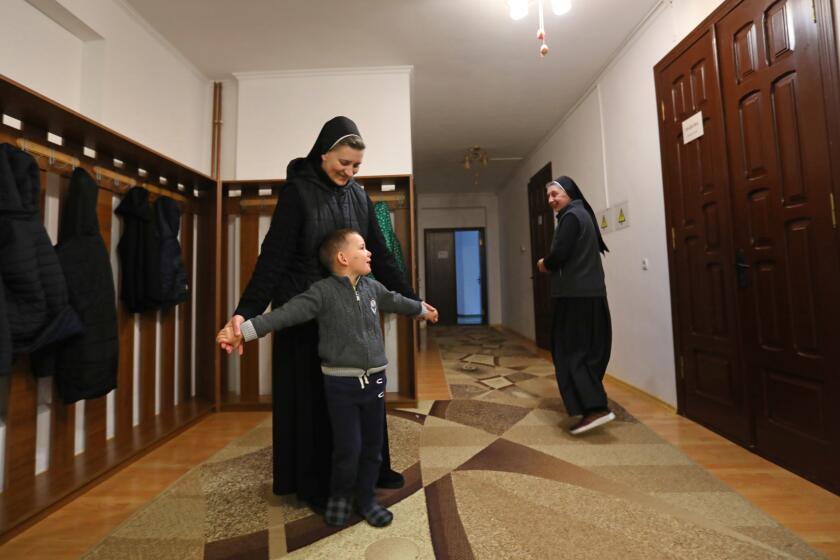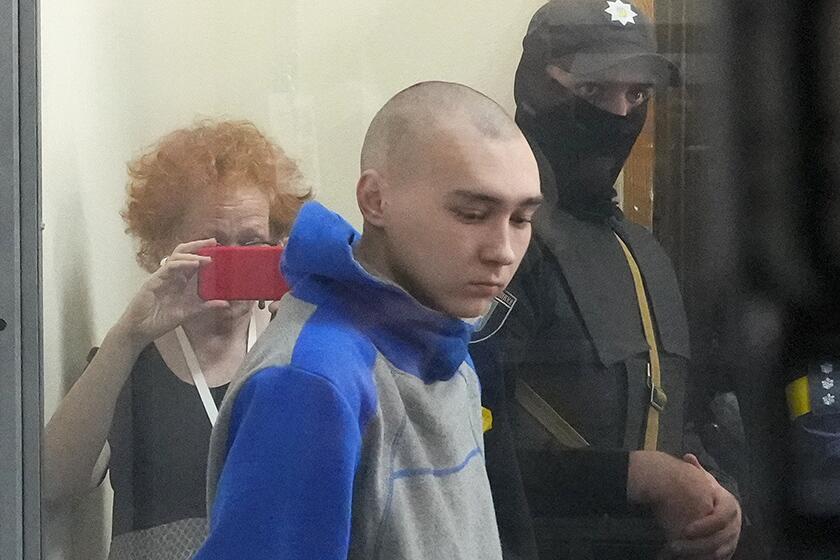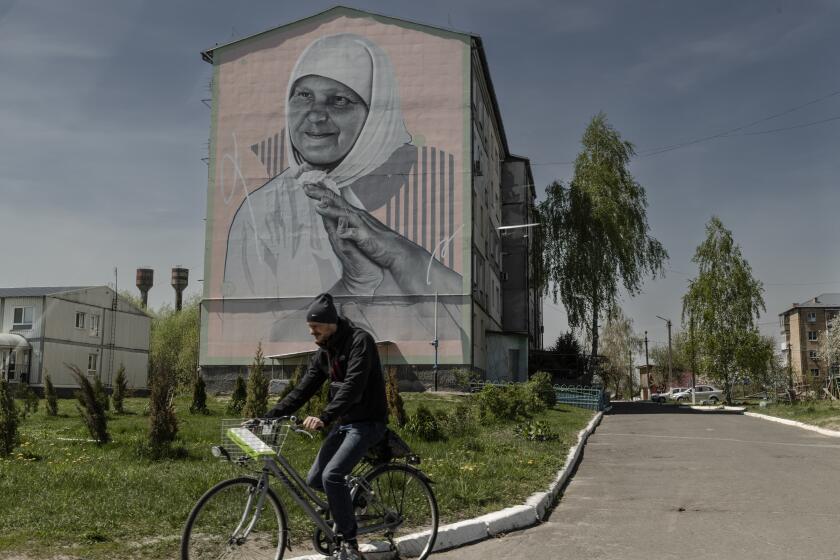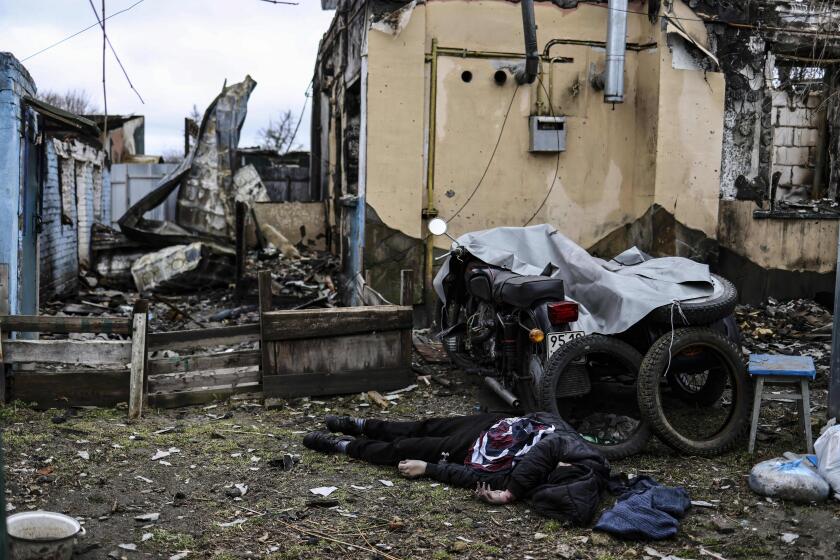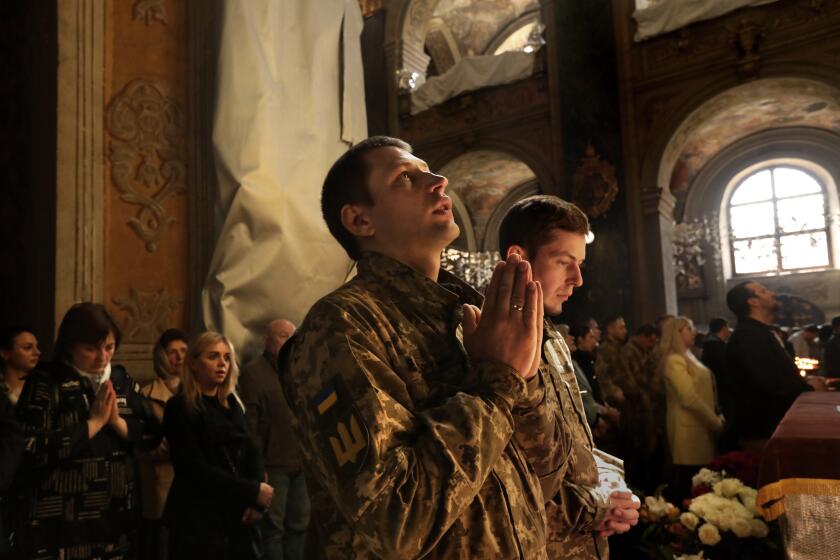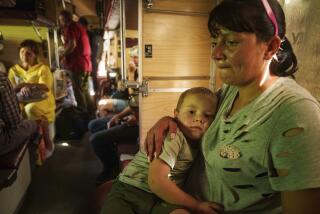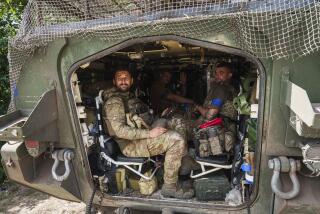Ukraine relinquishes Mariupol as Russia attacks both east and west
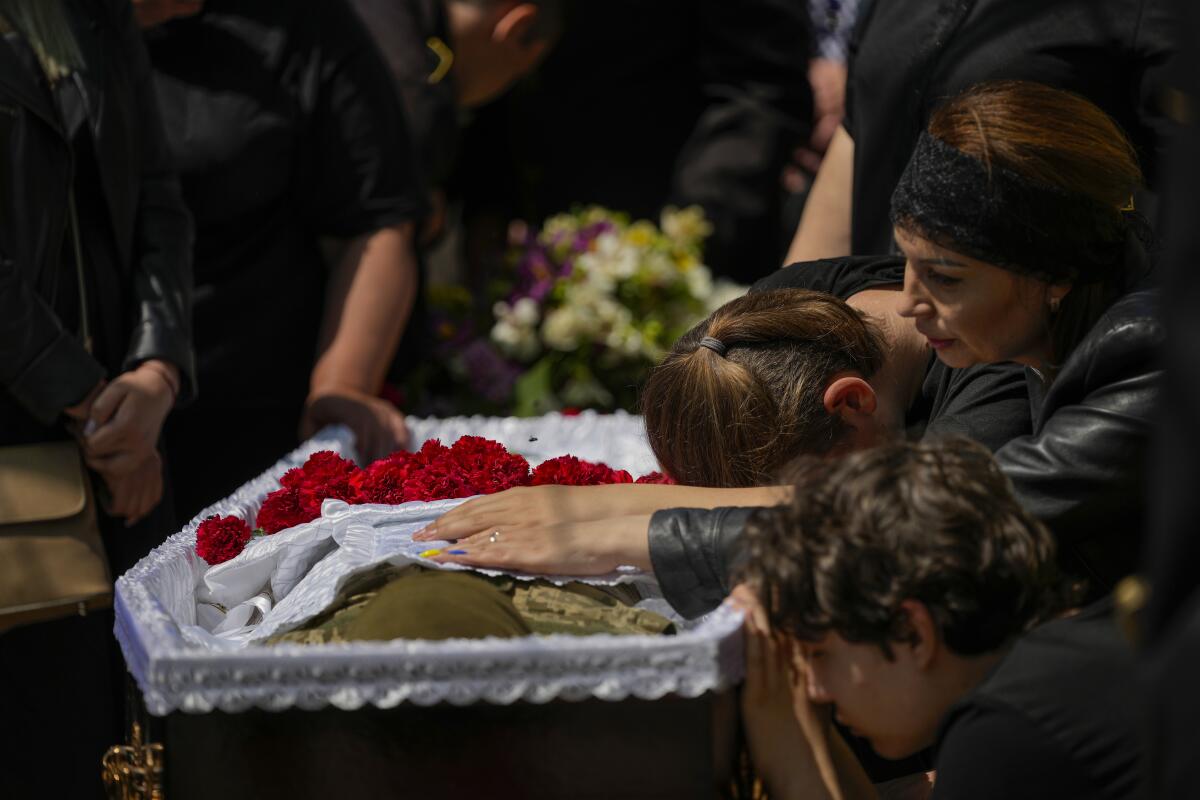
- Share via
LVIV, Ukraine — With full control of the beleaguered port city of Mariupol in hand, Russian forces kept up their assault Tuesday on eastern Ukraine, now the focus of a grinding conflict that bears the hallmarks of a grim war of attrition.
Images posted online depicted wounded Ukrainian servicemen taken on stretchers from the vast Azovstal steelworks in Mariupol to buses that evacuated them to a hospital in Russian-controlled territories. The sprawling plant was the soldiers’ last redoubt in the strategic city, whose capture gives Russia a badly needed victory and a bastion on the Sea of Azov.
Overnight, 264 Ukrainian defenders, including more than 50 who were seriously wounded, were evacuated from Azovstal under Russian military escort. More than 200 others were transported through a humanitarian corridor to Olenivka, a town controlled by pro-Russia separatists.
Much remains unclear about the evacuation deal, which appears to have been negotiated in secret under the auspices of the International Red Cross and the United Nations and was announced Monday by the Russian Defense Ministry. On Tuesday, Ukrainian Deputy Prime Minister Iryna Vereshchuk said the severely wounded servicemen would be exchanged for Russian prisoners of war “after their condition stabilizes.”
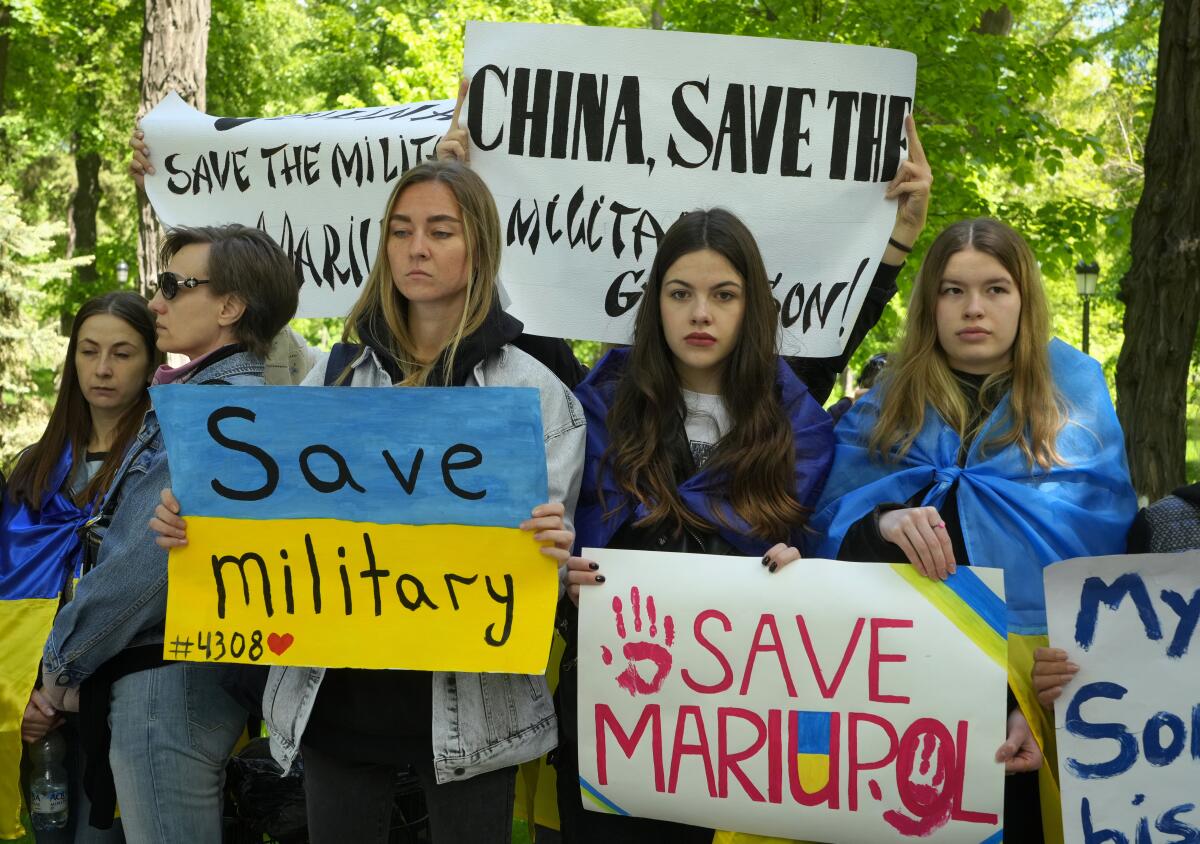
“We are working on the next stages of the humanitarian operation,” she added.
Also unknown is how many fighters remain inside the Azovstal plant, with commanders now under orders from the army’s high command to save the lives of their personnel instead of pressing on with their defense. Ukraine’s military said in a statement early Tuesday that efforts were continuing to save the remaining fighters, lauding them as “heroes of our time” who would be mentioned “forever in history.”
As the buses rumbled out of Azovstal, Russian forces continued attacks on eastern Ukraine, with their main efforts focused “in the direction of Donetsk province,” according to an operational update from the Ukrainian army’s general staff on Tuesday. The update said Ukraine had repelled 11 enemy assaults in the last 24 hours, including around the city of Severodonetsk, the easternmost area still under Ukrainian government control and the site of intense combat in recent weeks.
In a tranquil Ukrainian monastery, dozens driven from homes by war find refuge. The nuns say they will offer shelter as long as it’s needed.
Russian cruise missiles also struck locations near the northeastern cities of Chernihiv and Sumy, according to reports from regional authorities.
Ukrainian President Volodymyr Zelensky called it “sabatoge activity.”
“These strikes, like the many previous ones, do not fundamentally change anything,” he said in a video address. “This is kind of an attempt to compensate the Russian army for a series of failures in the east and south of our country.”
Ukrainian guerrilla fighters have also reportedly killed multiple high-ranking Russian officers in the Russian-occupied city of Melitopol, according to the regional administration, but the reports could not be independently confirmed.
In the west, a missile salvo — the second in three days — damaged what Lviv Mayor Andriy Sadovyi said on his social media channel was railway infrastructure near the town of Yavoriv, about 30 miles west of Lviv and a short distance from the Polish border. The town is home to a base used for NATO and U.S. military training of Ukrainian troops; more recently it hosted foreigners intending to join Ukraine’s defense before a Russian barrage there two months ago killed about 35 people.
“This was indeed one of the largest attacks on the Lviv region in terms of the number of missiles,” Sadovyi wrote. “It is difficult to predict what will happen next.”
There was no word on injuries or deaths. Ukrainian air defense intercepted three missiles, Lviv Gov. Maksym Kozytsky said on his official channel on the Telegram messaging service.
Ukraine has used postage stamps to boost wartime morale. One image stood out — and sold out. ‘Just felt what we all felt,’ young designer says.
The overnight aerial assault, which lighted up the night sky and shook the city center, had little effect on daily life in Lviv, where people have become accustomed to air-raid sirens and rocket attacks that typically target infrastructure.
“This has become normal for us,” said Vitalii Kos, who was a member of a work team Tuesday installing protective metal scaffolding around a monument in the Old City, part of an effort to shield monuments in the historic district. “This is part of our life now in Lviv.”
By contrast, most of Mariupol lies in ruins, its stately boulevards reduced to rubble by a relentless bombardment that has caused most residents to flee.
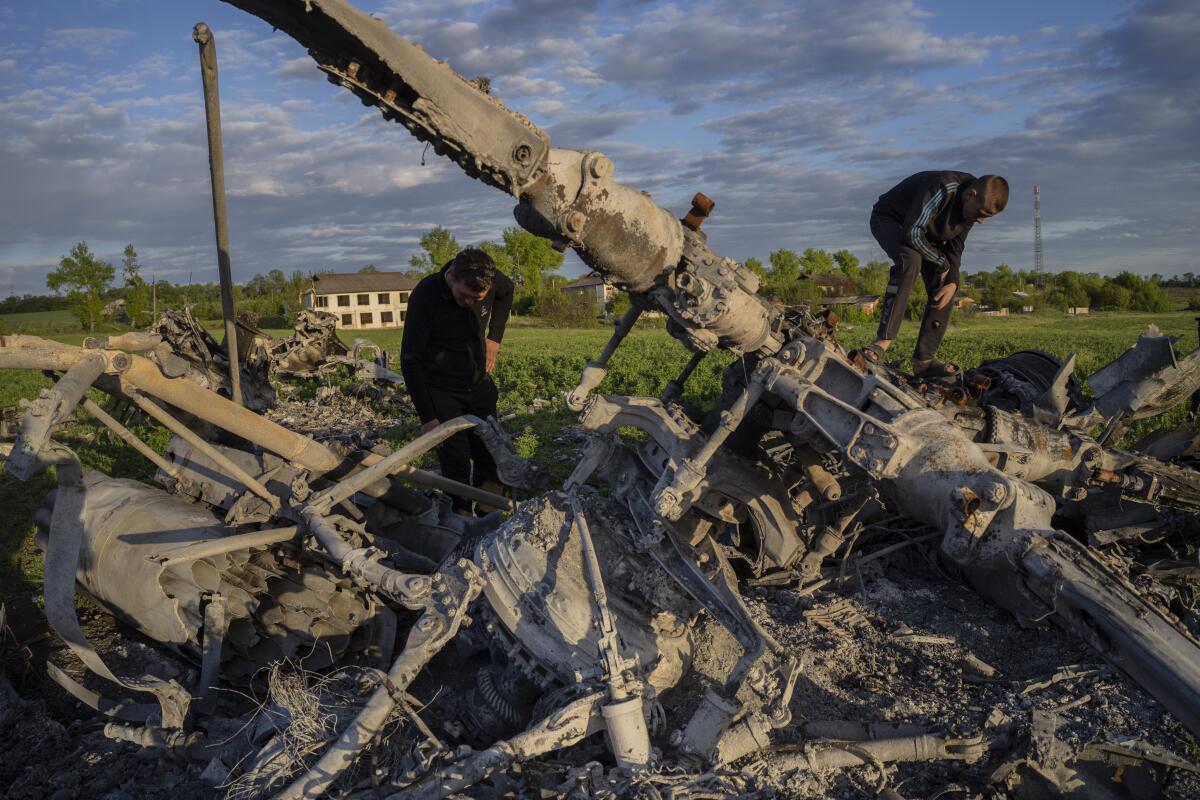
For weeks, Russian troops continued to strike the Azovstal plant, hoping to flush out the Ukrainian fighters bunkered in its network of tunnels. Women, children and elderly people who had also sheltered there were bused out to the Ukrainian-held city of Zaporizhzhia this month after a harrowing ordeal underground, with no sunlight and with fast-decreasing food and water supplies.
The evacuation of the fighters overnight Monday was described by Russia as a mass surrender; Ukraine said only that its troops there had completed their mission.
“It’s a relief, but it’s not the end,” Oleksandr Danylyuk, a Ukrainian army officer who once served as the country’s national security chief and finance minister, told the BBC on Tuesday.
Fighting rages in Ukraine, and Russia suffers losses along a strategic river. Top U.S. and Russian defense officials speak for the first time in nearly three months.
Russia’s tightened grip on Mariupol consolidates its position along the Sea of Azov and helps establish a land bridge to Crimea, the peninsula it annexed in 2014. The victory — Moscow’s first significant win in 83 days of fighting in Ukraine — should allow Russian military leaders to reorient forces stationed in Mariupol for combat operations in other disputed areas of Donetsk province or for a new push toward Zaporizhzhia, about 120 miles northwest of Mariupol.
Although Ukrainian troops were ordered at last to abandon Mariupol, they nevertheless bought time for their compatriots fighting on other fronts, occupying what the Ukrainian military said were up to 20,000 Russian personnel who would have been deployed elsewhere.
“We got the critically needed time to build reserves, regroup forces and receive assistance from partners,” the Ukrainian army’s general staff said in its statement.
Indeed, Moscow’s campaign in the east appears to have lost momentum, with its forces making costly but incremental advances even as Ukrainian units have begun their own counteroffensives meant to frustrate Russia’s advance around the Seversky Donets River. On Monday, Ukraine said its troops near the northeastern city of Kharkiv had pushed back invading forces to the border with Russia.
Russian bombs wrecked a small museum holding works by one of Ukraine’s best-known artists, Maria Prymachenko. But townspeople rescued a national legacy.
The claim could not be independently verified, but if true, it opens up a pathway for Ukrainian troops to harass Russian supply lines to Izyum, about 70 miles southeast of Kharkiv.
Those and other setbacks appears to have spurred a reevaluation of the Ukraine invasion even from inside Russia. On Monday, in a rare break with Moscow’s official narrative, retired Russian colonel and defense columnist Mikhail Khodaryonok gave a scathing assessment of the state of the war and dismissed claims of an impending collapse of Ukrainian forces’ morale.
“All of that, to put it mildly, is false,” he said on a talk show on Russian state TV, according to the BBC’s translation of the video broadcast.
Khodaryonok added that, with the U.S. and European Union poised to send tens of billions of dollars in military and humanitarian aid, the prospect of “a million armed Ukrainian soldiers needs to be viewed as a reality in the very near future.”
Breaking News
Get breaking news, investigations, analysis and more signature journalism from the Los Angeles Times in your inbox.
You may occasionally receive promotional content from the Los Angeles Times.
“The situation in this regard for us will frankly get worse,” Khodaryonok said, adding that Russia had become deeply isolated diplomatically and that, “however much we would hate to admit this, virtually the entire world is against us.”
That isolation increased Tuesday when Swedish Foreign Minister Ann Linde signed a formal application for her country to join the North Atlantic Treaty Organization, a step that neighboring Finland also is taking. Less than three months of a war in Ukraine has persuaded both nations to scrap decades of official nonalignment.
“It feels very big, very serious, and it feels like we have arrived at a conclusion which is the best for Sweden,” Linde told reporters. “We don’t know how long it will take, but we calculate that it could take up to a year.”
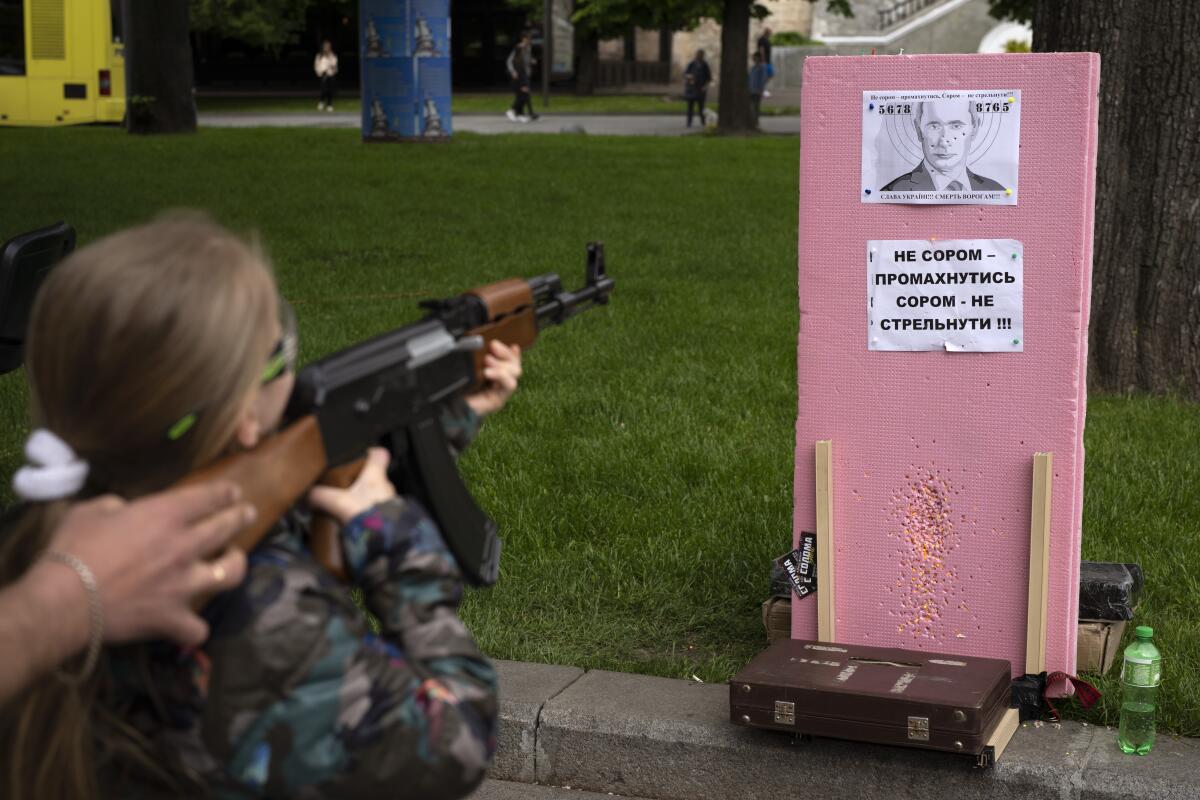
Later on Tuesday, the Finnish Parliament overwhelmingly voted 188 to 8 to proceed with Helsinki’s NATO bid. At a news conference with Finnish President Sauli Niinistö, Swedish Prime Minister Magdalena Andersson said the two countries would hand in their applications to the alliance Wednesday.
“Democracy has won,” Niinistö said. “This whole spring has been a triumph for democracy in Finland.”
Both leaders plan to meet with President Biden in Washington on Thursday to discuss “Finland’s and Sweden’s NATO membership, Russia’s warfare in Ukraine and the relationship of Europe and the United States in the changed security situation,” a statement from the Finnish Foreign Ministry said.
Weeks after Russian occupation, rural areas outside Ukraine’s capital still yield forest graves. Exhumations remain a near-daily task for police.
Despite the Kremlin’s earlier warning of serious repercussions if Sweden and Finland join the Western alliance, Russian Foreign Minister Sergei Lavrov on Tuesday played down the move, noting that the two Nordic nations have “been participating in NATO military exercises for many years.”
“NATO takes their territory into account when planning military advances to the east,” Lavrov said. “So in this sense there is probably not much difference.”
Still, Russia said it was expelling two employees of the Finnish Embassy in Moscow, which followed Finnish authorities’ decision to expel a pair of diplomats from the Russian Embassy in Helsinki. The Kremlin accused Finland of steering a “confrontational course towards Russia” by supplying “weapons to the Kyiv regime and covering up the crimes of Ukrainian nationalists against the civilian population” of the Donbas region — where Moscow recognizes two breakaway republics — and the rest of Ukraine.
Russia contends that Ukraine is controlled by neo-Nazis bent on persecuting ethnic Russians in various parts of the country.
Landmark church is a lodestar as Ukrainians mourn war dead and pray for living soldiers: ‘Here, we are all together,’ chaplain says.
Here in Lviv, the shifting tides of the war have changed the calculus of some Ukrainians. Lviv’s elegant 19th century railway station, which has been a way station for millions fleeing warfare, now hosts another group of travelers: evacuees returning to their homes after Russian forces have been pushed out of, or abandoned, areas such as Kyiv, Kharkiv and Chernihiv.
“It’s very emotional to be going home,” said Alina Cheechkan, 35, as she, her mother and her 7-year old-daughter, Victoria, awaited a train back to Kharkiv. “One feels happy, but also nervous.”
Like so many others, the three had fled Kharkiv in February as the Russians attacked. She has heard from her husband, who stayed behind, that the family home is intact.
With the three was Koblan Lesia, 29, a Lviv lawyer who lent her home to the displaced family. Such acts of generosity have been commonplace here, as residents hastened to help the millions uprooted by conflict.
“We did our small part to help,” said Lesia as she bade goodbye to her three unexpected guests.
McDonnell reported from Lviv and Bulos from Beirut. Emily Baumgaertner in Los Angeles contributed to this report.
More to Read
Sign up for Essential California
The most important California stories and recommendations in your inbox every morning.
You may occasionally receive promotional content from the Los Angeles Times.
